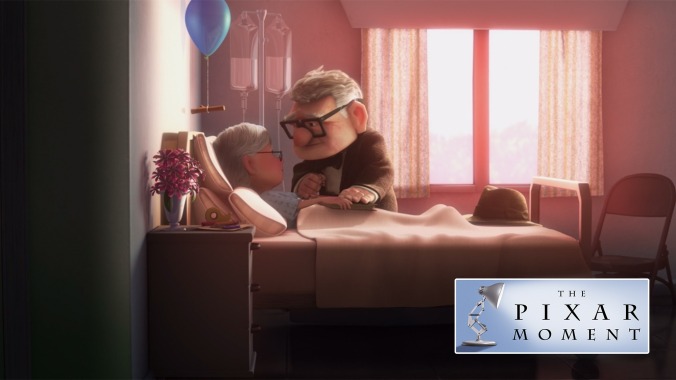Up crams a lifetime of joy and grief into 5 wordless minutes
Image: Screenshot: Up
When a critic refers to a film as “emotionally manipulative,” it’s usually meant as a bad thing. But perhaps the sin isn’t in milking the audience’s tear ducts and twisting their mouths into quivering, overcooked rigatoni noodles but in doing it poorly. After all, if you’re going to cry in public, a movie theater is a great place to do it: It’s dark, so you can make all the ugly faces you want in the enveloping, anonymous shadows. Ideally, it’s crowded, so no one can be sure just who is blubbering like a toddler whose ice cream fell onto the sidewalk. And there are usually bathrooms within ducking distance, so you can collect yourself and walk away from your nice, cleansing moment of catharsis refreshed and ready to go on with your day.
But even the most experienced movie-theater criers were not prepared for Up. By 2009, Pixar had established a reputation for combining heartwarming cuteness and devastating sadness. Six years earlier, it announced that even death was on the table by killing off almost an entire family of clownfish in the opening scene of Finding Nemo. But that was a movie about fish. Up is about humans and the human experience, which it condenses into a wordless five-minute sequence that The A.V. Club’s Tasha Robinson said “finally top[s] the death of Bambi’s mother on the pathos-and-childhood-trauma scale.”
Usually, a film has to build up to an emotional wallop like this one, offering it as the culmination of 90-plus minutes of getting to know and care about its characters. But Up springs devastation on the audience right away—and is rather sneaky about it besides. We open with a black-and-white parody of a 1930s newsreel called Spotlight On Adventure, where a narrator praises, in a mid-Atlantic honk, the derring-do of dashing explorer Charles F. Muntz. We pull back to a packed movie theater where no one is crying (yet), but Carl, an appealingly spherical boy in goggles, is bouncing with innocent excitement.
Within the span of a couple impeccably timed, pratfall-filled minutes, Carl has made a friend in the wild-haired, gap-toothed Ellie. Ellie’s words whistle through her teeth as she shares her dream of one day living atop the same Venezuelan waterfall Carl saw in Muntz’s newsreel, and it seems we’re up for a movie where these two moppets take off on an exciting adventure deep into the Amazon rainforest. There, they’ll probably meet some talking animals, sing a couple of songs, get swept up in rushing river rapids that take them over the aforementioned waterfall. Eventually, they’ll learn a lesson about how real heroes have heart or something. But not yet.
Instead, director Pete Docter defies our expectations by going from childhood to adulthood with the pop of a flashbulb. Ellie and Carl are getting married, and we learn everything there is to know about their dynamic from the families seated in the pews: large and exuberant on her side, small and somber on his. With similar economy, Docter takes us through their lives together, using visual symbolism to express both their triumphs—we learn Ellie’s pregnant when clouds in the shape of babies float over an afternoon picnic—and their heartbreaks. Parental death is common in animated films, but Up’s depiction of miscarriage and infertility is unusual, and not just because it is able to convey these themes without a single line of dialogue.
The decades pass in shots of coins being tossed into a jar, accidents that eat up all those coins, and a montage of Ellie briskly pulling a series of ties tight around Carl’s neck. Docter pulls back from that montage, and Ellie and Carl have grown old together, balloon boy and adventure girl still dreaming of Paradise Falls. Three efficient shots later—one of him having an idea, one at a travel agency, and one of him tucking plane tickets into a picnic basket—Carl’s ready to surprise his wife with what’s supposed to be the trip of a lifetime. But it’s not to be. Three more shots is all it takes for Ellie to get sick and die, and for Carl to give up on life. His beloved balloons are the poignant through-line.
Up does eventually get around to the adventure and the talking animals—silly, distractible pups whose ability to talk comes from the high-tech collars around their necks. (They don’t sing, which is probably for the best.) It’s cute and it’s funny and it’s well-animated, but without the novelistic level of biographical detail crammed into those first 12 minutes, we wouldn’t be as invested when the film comes back around for one more heartwarming moment at the end. But Docter doesn’t just want to make us cry; he wants us to feel all of life’s emotions, from childlike wonder to crushing grief, all at once. And if that means he’s got to play us like a conductor standing in front of a sniffling, puffy-eyed orchestra, so be it.